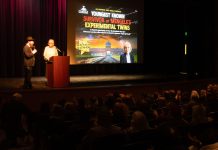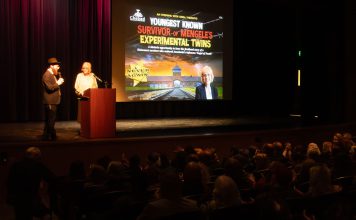GILROY
– David Oberstadt doesn’t have a child in the Gilroy Unified
School District yet. But when the three-year Gilroyan’s eldest son
begins kindergarten next school year, Oberstadt wants to make sure
he has a hand in improving student performance.
GILROY – David Oberstadt doesn’t have a child in the Gilroy Unified School District yet. But when the three-year Gilroyan’s eldest son begins kindergarten next school year, Oberstadt wants to make sure he has a hand in improving student performance.
Improving test scores and increasing the number of Gilroy students who move on to college are just some the catalysts for Oberstadt throwing his hat into the political ring. The Student Safety and Violence Prevention Act, approved by the California legislature in 2000, is another.
The law, which protects public school students and employees against discrimination and harassment, added “sexual orientation” and “gender identity” to the state’s nondiscrimination categories. Oberstadt said he wants to make sure the Gilroy Unified School District does not go “off track” by, for instance, using the law to hold programs with homosexual content which parents cannot have their children opt out of.
“There’s a place for that because children need to be aware of the different way people live, but parents have to have the opportunity to opt out,” Oberstadt said.
Oberstadt pointed to an event held at a school in Novato, Calif., as what he doesn’t want the district to ever do. Oberstadt said a program of skits depicting life in the homes of families with gay and lesbian parents was performed for students as young as 7 or 8, and parents were not given the option of removing their child for that segment of the day.
Curriculum
Oberstadt is familiar with delivering curriculum in Gilroy. He is a chatechism teacher for the local Church of Jesus Christ of Latter Day Saints. Oberstadt teaches a class for 17 year olds.
Oberstadt says the key to improving student performance is to have a superintendent with good leadership skills. He said Edwin Diaz and the district are “right on track so far.”
Oberstadt also wants to see the high school’s honors program continue.
“The general theory behind an honors program is that students who perform well should get more challenging work. I think that is a general principle that is good to follow academically,” Oberstadt said.
Oberstadt recalls his days in the Army boot camp at Fort Dix when certain recruits in “abysmal physical shape” could not keep up with him during runs. Drill sargeants would push all of the novice soldiers to run as a unit, nonetheless.
“It was fine to keep us together as a group, but there was absolutely no physical benefit to those who could run faster,” Oberstadt said. “It’s just like in schools, you’re going to have some who have a difficult time keeping up. I think the district needs to challenge those who can excel.”
Oberstadt sees an additional benefit to honors classes.
“I believe (that having honors classes) clears out room in the other classes so that students who are not performing on par with other students can get extra attention,” Oberstadt said.
Oberstadt has mixed feelings regarding the emphasis on standardized tests in recent years. He said there is a place for them as evaluation tools, but noted that there may be too many tests being required by the state.
“I’m also concerned about more state and federal control or influence on local schools. I’d like to see policies of schools kept as local as possible,” Oberstadt said.
Facilities
Oberstadt is in favor of Measure I, the district’s $69 million facilities bond that would construct a new high school and renovate several campuses. He voted against Measure D, Measure I’s predecessor, which failed in the March election by 146 votes.
Oberstadt said Measure I had “a number of improvements” over Measure D. Including construction costs for the new high school, rather than only covering the land purchase, was a wise move by the district, Oberstadt said.
“That’s a good long-term investment,” Oberstadt said, comparing it to buying a home.
In general, Oberstadt says he opposes financing facility construction and improvement with bonds. He wants school districts to finance facilities the way homeowners must pay for improvements and repairs.
“Engineers have a way to estimate the longevity of a water heater or a toilet. They can project, together with accountants, how much money a toilet will cost in 15 years when the old one isn’t good anymore. And then you can estimate how much you need to save each year to pay for it,” Oberstadt explained.
Communication
Oberstadt would like to see more parent involvement in curricular and extracurricular activities of students. But communication between parents and teachers is even more key.
He recalled the consistent communication his father, a part-time driver’s education teacher in Washington, would have with his student’s parents. Oberstadt said it not only helped parents keep track of their student’s performance, it made them aware of how their child behaved when outside the home, too.
“Canned comments on a report card … that kind of parent teacher communication is far insufficient,” Oberstadt said.













